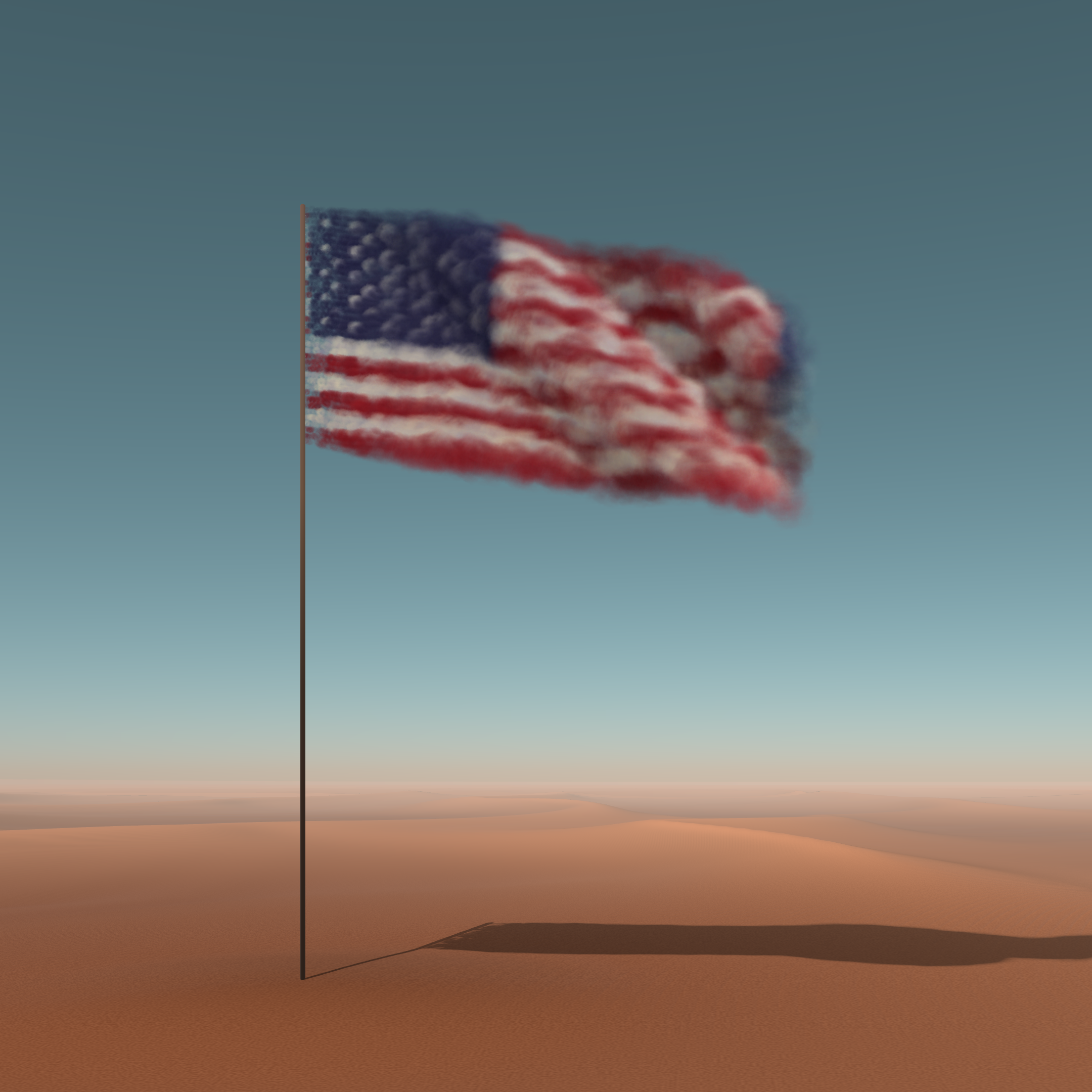
Twenty years ago, John Gerrard photographed an oil spill off the coast of Ireland. He’s been fixated on the politics, geographies, and aesthetics of hydrocarbons ever since.
In his 2022 series “Petro National,” the Irish artist cast the outline of countries as oil slicks adrift on the world’s ocean. The 196 NFTs were at once beguiling and unsettling, the allure of their iridescent sheen undercut by the catastrophes they depicted. Its brilliance was that a country’s oil consumption determined the size of its spill: the bigger the polluter, the greater the beauty.
John Gerrard, Petro National (2022). Photo: Pace Gallery and Art Blocks.
Gerrard’s latest clarion call is “World Flag,” launched by Pace Gallery’s Web3 platform Pace Verso in partnership with Art Blocks on June 28. In structure, it echoes “Petro National,” offering NFTs for each of the world’s countries, and exchanging oceans for deserts and oil slicks for flags.
Its visuals, however, are starker, its messaging blunter. If the oil spills teetered towards abstraction, the flags of smoke, which stand exposed in dull landscapes of endless sand, are representational and offer no such relief. Gone also is the luxury of high-resolution with the entire project adding up to 112 kilobytes in size.
The images are austere, the idea of a country claiming an utterly arid territory absurd. And that’s the point, humanity is knowingly racing towards ecological disaster. With “World Flag,” Gerrard baked politics into the aesthetics, here he also works it into the sale’s mechanics. The flags will be sold in order of carbon dioxide emissions, based on 2019 data from ClimateWatch, beginning with China and ending with Fiji, which signed a legally binding commitment to achieve net-zero emissions by 2050.
John Gerrard, World Flag #30 (Venezuela) (2023). Photo: John Gerrard / Artists Rights Society (ARS), New York.
“’World Flag’ is set in what I call ‘future deserts’—a hot lifeless world we are hurtling towards by burning 100 million barrels of oil a day,” Gerrard told Artnet News, noting the frustrating inaction he’d witnessed at the three UN Climate Change conferences he’d attended. “Trapped and competing from their nation states, we do not have collaboration or consensus on consumption.”
There is, of course, a tension at play between the project’s anti-carbon message and the reality of its footprint. In response, Gerrard is donating 10 percent of proceeds to a nonprofit organization that is restoring a temperate rainforest in Ireland—which, for the record, ranks 73rd in carbon dioxide emissions.
Gerrard sees “World Flag” as extending a triptych of smoke flags built in large game engines over the past half-decade. It began with 2017’s “Western Flag,” which stamped a black plumed flag in the virtual sands of Spindletop, Texas, the oil-rich terrain that birthed our dependence on hydrocarbons. It became the first NFT in Los Angeles County Museum of Art’s collection earlier this year.
John Gerrard, Western Flag, (2017). Courtesy the artist.
Next came “Flare,” a work that turned Gerrard’s sullen gaze toward the burning oceans and was staged alongside Cop26 in Glasgow and later at Pace.
Most recent, is “Surrender,” one of 15 artist responses to the climate disaster on show at London’s Hayward Gallery through September 3. It offers a billowing cloud of white vapor against the backdrop of California’s Mojave Desert. It’s openly in conversation with Gerrard’s national flags, though the precise tone of the interaction remains ambivalent. Is it a marker of defeat in the face climactic ruin or something more hopeful, a nod to the power of renewables, a flag beneath which we must all gather?
See other works from World Flag below.
John Gerrard, World Flag #21 (United Kingdom) (2023). Photo: John Gerrard / Artists Rights Society (ARS), New York.
John Gerrard, World Flag #163 (Gambia) (2023). Photo: John Gerrard / Artists Rights Society (ARS), New York.
John Gerrard, World Flag #1 (China) (2023). Photo: John Gerrard / Artists Rights Society (ARS), New York.